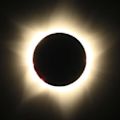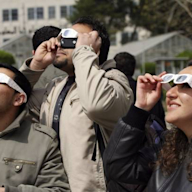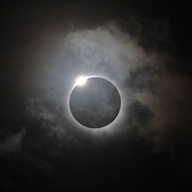Search results
People also ask
What is a solar eclipse & a lunar eclipse?
What is the difference between a solar eclipse and a lunar eclipse?
Why do we not get a lunar eclipse every month?
What is the difference between a solar eclipse and a total eclipse?
Apr 8, 2024 · Learn how solar eclipses and lunar eclipses differ in terms of duration, frequency, visibility and safety. A solar eclipse occurs when the moon blocks the sun, while a lunar eclipse occurs when the Earth blocks the moon.
- Solar Eclipse
- Lunar Eclipse
- Why Don’T We Have A Lunar Eclipse Every month?
- Remembering The Difference
- GeneratedCaptionsTabForHeroSec
A solar eclipsehappens when the Moon gets in the way of the Sun’s light and casts its shadow on Earth. That means during the day, the Moon moves over the Sun and it gets dark. Isn’t it strange that it gets dark in the middle of the day? This total eclipsehappens about every year and a half somewhere on Earth. A partial eclipse, when the Moon doesn’...
During a lunar eclipse, Earth gets in the way of the Sun’s light hitting the Moon. That means that during the night, a full moon fades away as Earth’s shadow covers it up. The Moon can also look reddish because Earth’s atmosphere absorbs the other colors while it bends some sunlight toward the Moon. Sunlight bending through the atmosphere and absor...
You might be wondering why we don’t have a lunar eclipse every month as the Moon orbits Earth. It’s true that the Moon goes around Earth every month, but it doesn’t always get in Earth’s shadow. The Moon’s path around Earth is tilted compared to Earth’s orbit around the Sun. The Moon can be behind Earth but still get hit by light from the Sun. In t...
It’s easy to get these two types of eclipses mixed up. An easy way to remember the difference is in the name. The name tells you what gets darker when the eclipse happens. In a solar eclipse, the Sun gets darker. In a lunar eclipse, the Moon gets darker.
Learn the difference between solar and lunar eclipses, how they happen, and why they are rare or common. See visualizations, images, and safety tips for viewing eclipses.
Sep 14, 2023 · Learn the difference between a lunar eclipse and a solar eclipse with this easy tip: the name tells you what gets darker. A solar eclipse makes the Sun dark, while a lunar eclipse makes the Moon dark.
Nov 9, 2023 · Learn the differences and similarities between solar and lunar eclipses, how they occur, and how to view them safely. Find out about the types, rarity, and history of these celestial phenomena.
Feb 9, 2018 · Learn how solar and lunar eclipses differ in terms of occurrence, duration, visibility, and safety. Find out the next dates and locations for observing these celestial phenomena.
Mar 23, 2024 · A lunar eclipse happens when Earth's shadow is projected onto the moon, while a solar eclipse happens when the moon blocks the sun's light and causes a shadow on Earth. However, both types...






